
Hey there! I’m John Cobb, CEO and co-founder of VuePlanner. Super excited to share our newest VuePoints newsletter with you! In this edition, I dive into all the cool stuff happening in contextual targeting, Beet Retreat, YouTube, and more. I’ve rounded up the most important updates from our ever-changing industry this past week, so you’re totally in the loop. Trust me, these insights are gold!

YouTube is Thriving. Advertising on YouTube Remains…Complicated
YouTube’s seen a recent uptick after a rough patch, raising questions about its share of advertising dollars. Its complexity and traditional buying structures might hinder its growth. Despite a revenue surge and increased TV-like consumption, navigating YouTube ads isn’t straightforward. Various ways exist to target the YouTube audience, but the complexity poses challenges, potentially causing missed opportunities. YouTube offers diverse entry points for brands, yet confusion persists, impacting ad effectiveness. Despite its immense reach and influence, YouTube might not be drawing ad budgets in proportion to its viewership. As linear TV declines and YouTube’s smart TV viewership grows, the ad landscape becomes more intricate, complicated by events like the Olympics and elections, necessitating adaptable approaches for success. Learn more.
Check out the super useful VuePoints Landscape diagram in the article.

How Media Agencies Are Preparing For Google’s Third-Party Cookie To Go Away – Actually This Time
This Digiday article explores how agencies are bracing for the permanent removal of Google’s third-party cookies, focusing on strategies to adapt to the impending change. It highlights the industry’s readiness to shift toward alternative solutions like first-party data and contextual targeting while acknowledging the challenges in maintaining personalized ad experiences without relying on third-party cookies. Agencies are actively exploring various avenues to navigate this shift and maintain effective advertising practices in a cookie-less digital landscape. Learn more.

Google Experimenting With New Generative AI Features for YouTube
Last week, Google introduced two new AI-driven features for YouTube aimed at enhancing the viewing experience. This article discusses how one feature organizes long comment threads into themes or topics using AI, enabling creators to engage with discussions or gather content ideas. Another AI tool provides contextual information, related content suggestions, and even quizzes for deeper understanding, initially available to a limited number of users, with YouTube Premium subscribers getting early access as part of experimental features. These features are part of Google’s experimental phase, aiming to gather feedback and improve functionality before wider release. Learn more.
YouTube Requires Creators To Label Synthetic Content
This MediaPost article discusses how YouTube has implemented a new policy mandating creators to label AI-generated or synthesized content. This requirement aims to distinguish between AI-altered videos and genuine human-created content, fostering transparency for viewers. Creators must now disclose if AI tools significantly modify audio, visuals, or content structure in their videos. This policy change is a response to concerns regarding deepfakes and misleading altered content on the platform. Learn more.

This week, I have really enjoyed listening to the Harvard Business SchoolIdeaCast podcast. Episode 939 is a conversation with Michael Gervais about how to overcome the fear of other people’s opinions to perform at your best. Give is a listen for yourself here.

This week’s post of the week spotlight goes to Andy Plesser . He highlights how powerful it was to be a part of opening night at Beet Retreat in Santa Monica. Scott Schiller and I are attending the retreat this week and were blown away with the opening night discussion about Media Buyers Thinking About the Future. Mike Solomon from PHD Media, Kelly Metz from Omnicom, Lisa Giacosa from Spark Foundry, and Brad Stockton from dentsu held an incredible discussion about key industry developments during the next five years. Check out his post here.
